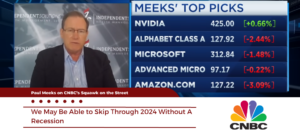The market is efficient. That is, available information is immediately baked into securities prices. When I was a young analyst, that was not necessarily the case. I knew stuff that you did not, and that was not fair. You would think that regulators closed that loophole. Under pressure, they tried but failed, or at least they did not have the positive impact that they thought they would. What leveled the playing field in the late 1990s was the Internet. All investible information is now available to all in real-time for free. Today, you only have yourself to blame if you do not do your homework. Few of you even need a financial advisor these days. When I started my investment career in the 1980s, my firm paid hundreds of thousands of dollars for data to calculate Wall Street consensus estimates for companies’ quarterly earnings per share and revenues. Now you can quickly pluck them from Yahoo! Finance. Just go to any stock’s “Analysis” tab.
Why do I tell this sob story? I do so to make a critical point: No matter how nasty something you hear or read, it is not a “thing” because it will not impact securities prices if it is already known. The market only plunges in reaction to big negative surprises. Of course, the same goes for positive shocks. Successful Investing is all about taking contrarian long and short (i.e., a bet that prices will respectively rise or fall) positions and being as right as you are bold.
China is making me anxious. You may have heard about the implosion of Evergrande, which is a major residential real estate developer there that has defaulted on its enormous debts. It is game over when you are heavily levered when an asset bubble pops as this one has. We global investors should know better. In the U.S., the Financial Crisis began for most in September 2008 after one of our top investment banks, Lehman Brothers, collapsed under the weight of its toxic derivatives related to residential mortgages. (The Citadel’s Professor Meeks assigns you the documentary “Inside Job” to watch to understand what led to that mess, which was a problem that we exported to the world). Like the U.S. banks that were bailed out by then Presidents George W. Bush and Barack Obama, Evergrande will be rescued, or at least somewhat supported, by the Chinese government because this problem child is also probably domestically “too big to fail.” Even if the feds play hardball, the unwinding of Evergrande’s debts should not cause a global contagion like ours did 13 years ago. U.S. banks and bond investors will lose money on Evergrande, but its impact will not be globally systemic. Bottom line: I would buy any dips in U.S. stocks based on these particular Chinese shenanigans.
Frankly, I worry about more that Chinese General Secretary Xi Jinping — who is only 68 years so we will deal with him for another 20 years or so — is steering his nation toward party founder Mao Zedong’s socialist principles. “Toward” is different than “to.” Nonetheless, Jinping is much more of a hardliner than any Chinese leader since Zedong died in 1976. He has cracked down on the private sector since the fall of 2020. He has let Evergrande flounder thus far. However, Jinping has been particularly vengeful against China’s technology companies, which have become global stars, which means, of course, they must be brought to heel. Since China is the world’s number two economy and is poised to surpass us in ten years or so, its blend of capitalism and socialism is critical to us.
I hope that we are “peak” COVID’s delta variant. So far, this stage of the pandemic has slowed down a U.S. economy that had seemed to be overheating as it reopened last spring. We, market watchers, are as nervous about an economy growing too fast as too slow because the former can trigger inflation, which is the scariest Boogeyman. I still am worried about inflation regardless of what the optimists say, including those at our central bank, the Federal Reserve Board (Fed), which controls monetary policy (read: they lower interest rates to goose the economy and raise them to slow it down to rein in inflation), who claim that the recent spike in prices is temporary. I am not so sure. Here is an example: Last week, FedEx announced its quarterly earnings. Its stock plunged on the announcement. Why? As I wrote above, they negatively surprised investors. And, yes, they cited inflation — specifically, $450 million in extra costs in three months — as the reason they badly lagged the Street’s consensus earnings forecast and guided to more disappointment in future quarters. The talking heads are saying one thing about inflation, and companies say something else with their financial results. Be afraid…be very afraid. If the Fed unexpectedly — remember, surprises are the only things that matter to the market — jacks up rates to stave off inflation, this bull market may be over.




